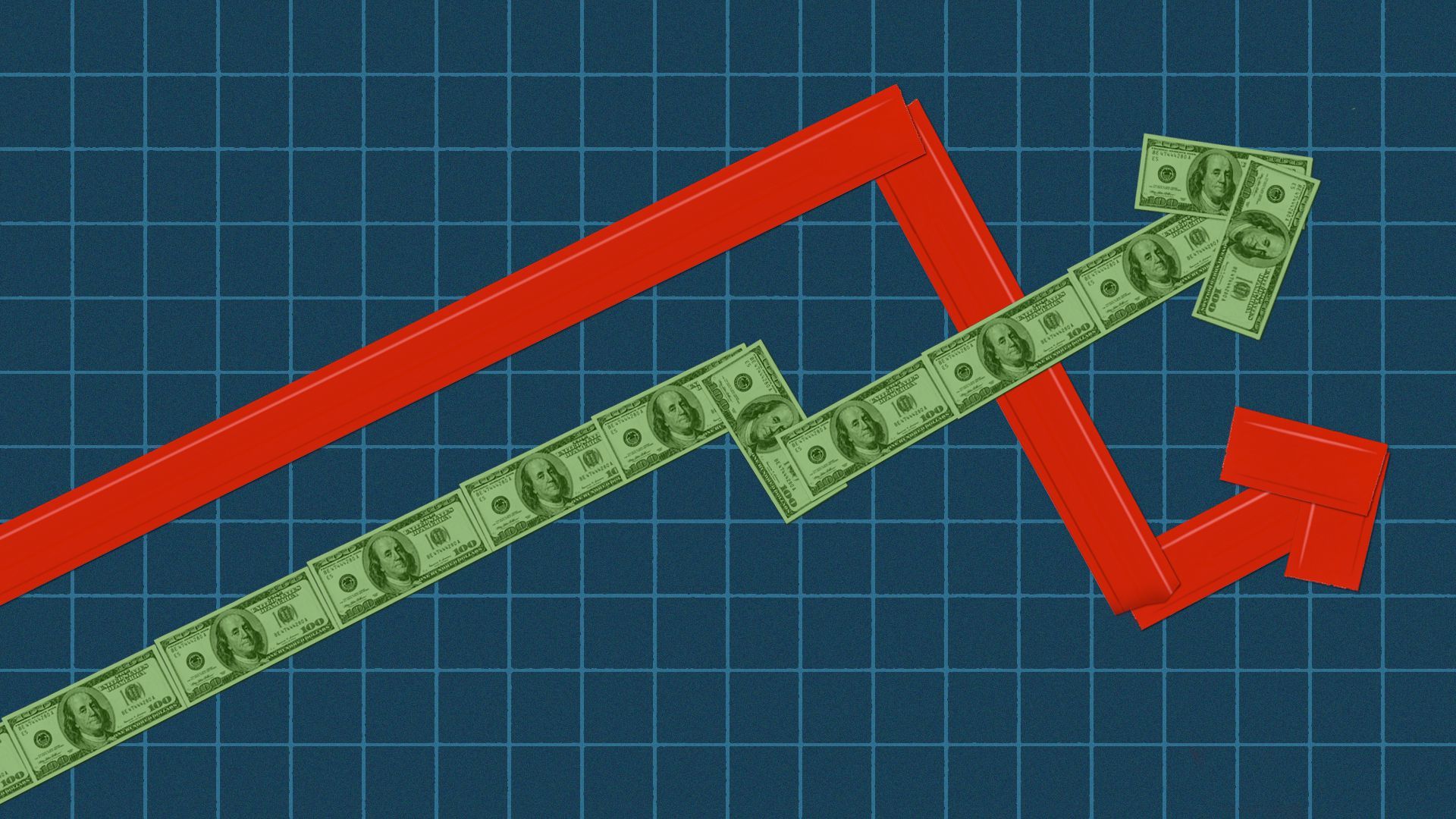| | | | | | | Presented By Aon | | | | Axios Markets | | By Sam Ro ·Aug 16, 2021 | | Today's newsletter is 1,340 words, 5 minutes. 📈 of the day: 87%, the percentage of S&P 500 companies that beat analysts' revenue estimates in Q2. | | | | | | 1 big thing: A sobering data point |  Data: University of Michigan; Chart: Axios Visuals Consumer sentiment plummeted in early August, according to a widely followed survey. Why it matters: Deteriorating sentiment signals trouble for the economy if it means consumers pull back spending. - Before the August reading, sentiment had generally been improving for much of this year, as the U.S. economy was on a tear going into July. Then COVID infections spiked as the Delta variant spread.
By the numbers: According to preliminary August survey results, the University of Michigan's consumer sentiment index plunged to 70.2 from 81.2 in July. - This was the lowest reading since December 2011 and was much worse than the 81.0 level expected by economists.
- The current economic conditions subindex declined by 6.6 points to 77.9, while the consumer expectations subindex dropped 13.8 points to 65.2.
What they're saying: "It's just one data point, but sobering," CIBC Private Wealth CIO David Donabedian says. "It reinforces our expectations of higher market volatility over the course of the year." Yes, but: The survey's chief economist Richard Curtin says, "The extraordinary surge in negative economic assessments also reflects an emotional response, mainly from dashed hopes that the pandemic would soon end." - From an economic perspective, emotions are not as impactful as the actual job gains, wage gains and stock market gains that consumers have been experiencing.
- "Sentiment has given misleading signals on spending before and we think it will do again this time," ING chief international economist James Knightley says.
The big picture: What consumers say or feel doesn't necessarily match what consumers do. In fact, early evidence from corporate earnings calls and credit card data suggests consumer spending activity has been relatively stable. - Government-mandated mobility restrictions would be bad for activity. But "we are also highly doubtful that we will see new lockdowns happen in the U.S. given high vaccination numbers that continue to rise," Knightly adds.
What to watch: The July retail sales report, which will be released on Aug.17, will provide a comprehensive, albeit early, read on the Delta variant's impact on spending during that month. - But if most of the turn in sentiment occurred in August, we'll have to wait for the subsequent report on Sept. 16.
|     | | | | | | 2. Catch up quick | | China's industrial production and retail sales activity slowed by more than expected in July. (Reuters) Saudi Aramco is in talks to acquire Reliance Industries in a $25 billion deal. (Bloomberg) The cryptocurrency market's value topped $2 trillion for the first time since mid-May as bitcoin rose above $48,000. (CNBC) |     | | | | | | 3. Execs talk climate change |  | | | Illustration: Annelise Capossela/Axios | | | | Corporate action to tackle climate change ranked among the top themes on S&P 500 companies' Q2 earnings calls, Axios' Hope King reports. Why it matters: July was the hottest month on record. Last week's UN-sponsored climate report projected the Earth will potentially cross a crucial temperature threshold less than a decade from now. The big picture: "For corporates, meeting ESG demands from investors is becoming an increasingly formidable task, requiring sustainability reports and additional ESG headcount," Goldman Sachs strategist David Kostin writes. - Investors are continuing to ask for ESG-themed investment products, including green bonds, they add.
Goldman highlighted a batch of executive comments, each speaking about their respective companies' goals to improve the sustainability of their operations. - "Our strategy aligns with the world's growing need for affordable, reliable and cleaner energy that is necessary for human prosperity and global economic development. ... [We] support the aim of the Paris Agreement and a global ambition to achieve net-zero emissions by 2050," a Hess executive said.
- "We're moving forward with investments in energy reduction, increased utilization of renewable energy and evaluation of new low-carbon technologies," said an exec at LyondellBasell Industries.
Among the standout remarks were those who cited specific actions and results. - Qualcomm: "As part of our ongoing ESG efforts, we recently started purchasing 100% renewable solar energy for our San Diego headquarters."
- Interpublic Group of Companies: "[We] announced an action plan that consists of 3 climate roles: committing to set a science-based target; sourcing 100% renewable electricity by 2030; and joining The Climate Pledge, co-founded by Amazon in Global Optimism."
- Caterpillar: "Our 2020 sustainability report highlights 7 new environmental, social and governance goals we've set to achieve by 2030. … One of these goals is to ensure that 100% of Caterpillar's new products through 2030 will be more sustainable than the previous generation."
The big picture, as Hope recently reported: Critics of corporate greenwashing are growing in number, and shareholder support for environmental proposals is growing. |     | | | | | | A message from Aon | | Helping employers build better talent pipelines | | |  | | | | We're investing $30 million over the next 10 years to create 10,000 apprenticeships nationwide. As a founding member of the OneTen coalition, we're committed to doing our part to build talent pipelines of highly skilled and diverse professionals. | | | | | | 4. Beijing regulatory crackdown has investors scurrying |  | | | Illustration: Brendan Lynch/Axios | | | | Investors are reevaluating their appetite for China-related bets following a pickup in Beijing's regulatory actions, Hope writes. Catch up quick: Chinese regulators have made their way into a broad spectrum of domestic industries. That includes moves that limit business growth, like banning DiDi's app or prohibiting tutoring companies from teaching specific curriculum, as well as increasing scrutiny of online insurance companies and fintechs. Why it matters: China-related investments were viewed as high growth opportunities as recently as last fall. Beijing's investigations and edicts are a reminder that "the invisible hand wears a red glove" in China, as Jason Hsu of Rayliant puts it. In response, institutional funds are reassessing investment risks and will likely liquidate some positions, UBS Global Wealth Management's Kelvin Tay tells CNBC. - Veteran investor Mark Mobius says there have already been fund inflows redirected into India and other emerging markets, per Reuters.
Some venture capital investors, including SoftBank Group, have started advising portfolio companies to stay away from investing in Chinese companies. On the other hand, some investors are taking advantage of price dips. - Over the course of a week in late July, $3.6 billion in new money flowed into funds focused on Chinese stocks, Cameron Brandt, director of research at EPFR, told CNBC.
- And KraneShares' CIO Brendan Ahern tells Axios that he's seeing inflows to the KraneShares CSI China Internet ETF (KWEB) even as the fund's shares have declined by 30% since the start of July.
- Ahern believes "investors are taking advantage of the disconnect between the KWEB companies' strong fundamentals versus the weak price action."
What to watch: "A combination of slowing growth, deepening policy concerns and recurrent flare-ups in the virus is likely to make for difficult terrain for investors," Capital Economics' chief economist Neil Shearing writes. |     | | |  | | | | If you like this newsletter, your friends may, too! Refer your friends and get free Axios swag when they sign up. | | | | | | | | 5. Companies aren't ready for the end of Libor |  | | | Illustration: Sarah Grillo/Axios | | | | It's a little like the tale of the boy who cried wolf, Axios' Kate Marino writes. - Regulators have been telling the market for more than a decade that the Libor rate benchmark's end was nigh. But now that it's really, seriously, going to end as of December, loads of big companies are unprepared.
Why it matters: Companies that don't adequately prep for the death may wind up paying the price in time and money, Amol Dhargalkar, global head of corporates at financial risk adviser Chatham Financial, tells Axios. - One example: If the benchmark on a company's debt winds up differing from the benchmark that its associated hedges — like interest rate swaps — are pegged to, then it could cost the company money if the two benchmarks move in different directions, Dhargalkar says.
Backstory: Libor fell out of favor after widespread manipulation of the rate came to light in 2008. Regulators began laying the groundwork to phase it out shortly after (read more about that here). - The Federal Reserve has said that loans and derivatives contracts issued after Dec. 31, 2021, can't be tied to Libor. By June 2023, all legacy Libor contracts must transition.
- More than $200 trillion in global debt is currently Libor-based.
State of play: The companies that are being proactive are currently taking inventory of their total Libor exposure, moving agreements to new benchmarks where they can, and getting pricing indications to understand how to address their future needs, Dhargalkar says. But, but, but: Chatham recently surveyed 100 corporate treasurers — from companies with revenue between $1 billion and $25 billion — and 39% of respondents were "completely unsure if there are any urgent to-do items to act on in response to the transition." |     | | | | | | A message from Aon | | The value of better data & analytics in managing a highly volatile world | | |  | | | | Garnering insights from data is critical to an organization's operations and growth, especially when it comes to preparing for systemic risks like climate change. Aon gleans insights from complicated data to help companies make better decisions. Read more from Aon COO James Platt. | | |  | | It'll help you deliver employee communications more effectively. | | | | | | Axios thanks our partners for supporting our newsletters. If you're interested in advertising, learn more here.
Sponsorship has no influence on editorial content. Axios, 3100 Clarendon Blvd, Suite 1300, Arlington VA 22201 | | | You received this email because you signed up for newsletters from Axios.
Change your preferences or unsubscribe here. | | | Was this email forwarded to you?
Sign up now to get Axios in your inbox. | | | | Follow Axios on social media:    | | | | | |











No comments:
Post a Comment